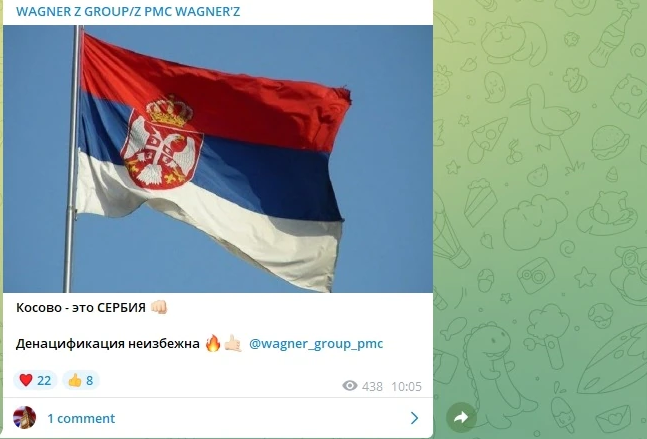More than two decades after the war that led to Kosovo’s independence from Serbia ended in 1999, relations between Serbia and Kosovo remain tense; for Serbian President Aleksandar Vucic, the Kosovo situation “has never been as complex and difficult as it is today,” as he told the nation in his dramatic address on live television this week.
But Vucic is rarely to be trusted (if ever) and may well benefit from controlled instability in the region, as he is believed to have in the past. And when he needs instability, Kosovo is the place.
While Kosovo is recognized as a country by most of the world, most of Europe included, Serbia has never recognized its independence, nor have any of the BRICS nations; notably, and a continuing source of friction, the Serb minorities living in Kosovo, particularly in the northern part near the border, still feel mistreated.
The most recent episode concerns the blocking of roads near two key border crossings on July 31 by the Serb minority, outraged by a new set of administrative measures the Kosovar government was set to impose the following day, on August 1 (or following instructions from Belgrade, or both).
On Sunday evening, hundreds of ethnic Serbs parked trucks, tankers and other heavy transport vehicles on roads towards the Jarinje and Brnjak crossings with Serbia, blocking traffic, an AFP correspondent said 👇https://t.co/iXaQrGB8ma
— The New Arab (@The_NewArab) August 1, 2022
The Kosovar government first closed the two border crossings but then decided to postpone the measures to September 1, opening the borders again on the morning of August 1 and diffusing the situation.
Kosovo police confirm that the two border-crossings Jarinje and Brnjak are now open for transport, following the removal of all nine barricades set up by locals yesterday evening. The implementation of the new travel regulations is postponed until September 1st.
📸@balkaninsight pic.twitter.com/EvjmJc986I
— Marija Ristić (@Marien__R) August 1, 2022
When these new tensions reached their peak, on July 31, many Russian and pro-Russian Telegram channels began sharing the same messages, just a couple of minutes apart and in both Russian and Serbian, spreading lies about the blockade, manipulating information and calling for violence.
Among many things, the messages, clearly orchestrated and unbacked, said that a Serb had been injured at the blockade of Jarinje, one of the two biggest border crossings between Serbia and Kosovo.
There are two problems with these messages. First, there is no evidence whatsoever that anyone was injured during the tensions, with both Serb and Kosovar authorities denying the claim.
And second: Those injury claims, far from being the only dangerous and false information shared on these channels, point to Russia’s possible interest in escalating tensions in the Balkans.
Why the tensions (again)?
To understand the situation, it helps to go into the details and see what the dispute is about. At midnight on August 1, the government of Kosovo was meant to implement new rules that would require owners of Serbian car plates (who are citizens of Kosovo) to switch them to ones issued by Kosovo upon entering the country.
In other words, as N1 points out, the measure would eventually get rid of Serbian car plates in Kosovo, which the local Serbs have been allowed to use since 1999 (there are over 10,000 cars with Serbian car plates in northern Kosovo alone).
The rules would also force all people entering Kosovo with Serbian papers to get extra documents that would only allow them to stay in Kosovo for up to 90 days and cost about five euros.
Kosovo declared its independence from Serbia, unilaterally, in February 2008. This has been recognized by over 100 countries around the world, including most Western powers, but not by Serbia (or Russia) which still considers it Serbian territory.
Still, over the years, the Serb populations in Kosovo have (reluctantly) been submitting to the new Kosovo laws and authorities. The Serbian army and police, for instance, have not been allowed to set foot on the territory of Kosovo since their withdrawal in 1999 following the Kosovo war.
Until this weekend, Kosovo Serbs were still allowed to use Serbian documents and Serbian car plates in Kosovo.
While ethnic Albanians today make up over 90% of Kosovo’s population, areas in the north that border Serbia are still majority Serb-populated. The new rules, as the Guardian put it, were the latest in a line of Kosovo’s attempts to “bring majority Serb areas under its full control.”
Responding to the prospect of new rules being implemented, Kosovo-Serbs gathered on Sunday night, the evening before the measures were scheduled to be implemented; using trucks and tankers, the protestors blocked the roads leading to the two biggest border crossings, Jarinje and Bernjak.
Shots were reportedly fired, although no injury was reported, and, for the first time in years, air raid sirens could be heard again in Kosovo’s Serb-majority towns in the north. Kosovar authorities blocked the two border crossings and, as it usually happens when new tensions rise, local leaders started pointing fingers and talking about “winning and losing,” yet again.
🚨 Apparently, there are air raid sirens in Kosovo. I’ll provide more information soon regarding what’s going on. pic.twitter.com/mo8eVZNoBJ
— Ivana Stradner (@ivanastradner) July 31, 2022
Important Western players in this game and NATO in particular, whose KFOR mission has 3,770 troops in Kosovo, were similarly quick to react:
“The NATO-led KFOR mission is monitoring closely and is prepared to intervene if stability is jeopardized,” KFOR wrote in a statement on July 31.
— NATO Kosovo Force – KFOR (@NATO_KFOR) July 31, 2022
According to BBC, US Ambassador in Kosovo Jeffrey Hovenier asked the government of Kosovo to postpone the implementation of the new license plate rules by 30 days “because it seems that there was misinformation and misunderstanding about the decision.”
What sort of misinformation or misunderstanding Hovenier was referring to remains unclear, but Kosovo did agree to delay the move.
The new rules are now expected to be implemented on September 1, 2022.
The Russian disinformation campaign expands to Kosovo
Unsurprisingly, the situation in Kosovo has grabbed the attention of Russian and pro-Russian Telegram channels.
Shortly after 7 pm at the peak of the tensions on July 31, many of these channels, one after another, began sharing the same post: A Serbian national has been injured during the protest near one of the border crossings.
The message, however, was not backed by any evidence while both Serb and Kosovo authorities said no one was injured. Similarly, none of the hospitals in the region reported receiving anyone with injuries.
Another post shared by several channels on Telegram in a short time period included a photo of an unidentified person in an army uniform and said the Serbian army is “combat ready” at the administrative border crossing between Serbia and Kosovo.

Since 2001, the Serbian army has been allowed to patrol the area around the administrative border as long as it doesn’t cross it.
The Serbian Defense Ministry quickly denied the claims, writing on its website that “[f]or now, the Serbian Army has not crossed the administrative line and has not entered the territory of Kosovo in any way.”
A mere half-hour later, a Serbian Telegram channel with 61,000 followers released “unofficial reports” of Serbian airplanes being transferred to airports in Kosovo. The same “report,” alongside a photo of what a military jet at an airport, was then shared on Russian Telegram channels “Serbski Vestnik,” “Velika Rusija,” and “Orlovi.”

These reports cannot be found anywhere else, nor have they been confirmed or even mentioned by anyone anywhere since.
Soon after, “Rosich,” one of Russian Wagner group’s Telegram channels with almost 100,000 followers, wrote that Serbian President Aleksandar Vucic announced on Sunday that the Kosovo Army planned on attacking the Serb-majority north of Kosovo at midnight — a message that was soon shared across other Russian Telegram channels. Note that the Wagner group are Putin’s mercenaries that he has used in Syria and is now using in Ukraine.
In reality, all Vucic said at the press conference that evening was that the Kosovo authorities will implement the new administrative rules at midnight.
Another post that was widely shared on Telegram on July 31 said: “Kosovo Serbs are pulling out their hidden weapons. And trust us, there are plenty of illegal guns out there.” Shared by many Russian and pro-Russian Telegram channels at around the same time, the post included a photo of weapons on a table next to food and drinks.
But much more dangerously, many of the channels also called for and encouraged violence against ethnic Albanians.
The Wagner group channel, for instance, said it hopes “President Vucic will have the determination to issue the order” for military intervention and that the Serbian army will be strong enough to “raze Albanians to the ground.”
Meanwhile the channel “Orlovi” (in English “Eagles”), which is run by NGO “Russian-Serbian center Eagles” based in Saint Petersburg, shared old footage of a group of men burning an Albanian flag and calling for the murder of Albanians.
“We are anticipating actions like this tomorrow throughout Serbia and beyond,” the video caption read.
Finally, on August 1, among many other similar messages, the Wagner Groups’ official Telegram channel shared a photo of the Serbian flag with the message: “Kosovo is Serbia. Denazification is inevitable.” And “denazification” is, of course, Putin’s avowed pretext for waging war against Ukraine.

While Russian and pro-Russian Telegram channels have a relatively long and successful history of serving the Russian propaganda machine, their work has rarely been this organized, synchronized and, well, involved pushing out similar and unoriginal content (many of the Kosovo posts shared were identical).
And until the start of the Ukraine war, when they seem to have significantly stepped up their game, the presence of Russian and pro-Russian Telegram channels in Serbia was hardly noticeable.
By now, however, there are many pro-Russian Telegram channels that publish in Serbian only, spread information without evidence, call for violence, and even target individuals within Serbia who openly oppose the Ukraine invasion.
As research director of the Belgrade center for security policy Predrag Petrovic put it, such narratives are dangerous as they further “militarize the public.”
“They create a feeling of the necessity for military action for the sake of realizing some interests, in this case the realization of national interest as they see them. Precisely such militaristic announcements, which target emotions, attract a good part of the public,” Petrovic said.
And in Serbia, torn between feeling pro-Russian and pro-EU, such messages resonate. The bombing of Serbia by NATO created a deeply polarized society, and, unsurprisingly, the public reacts emotionally to fabricated news like this report of a wounded Serb in Kosovo.
For now, tensions have abated but expect them to rise again on September 1 and unfortunately, not only then.
Editor’s Note: The opinions expressed here by the authors are their own, not those of Impakter.com – In the Featured Photo: Sgt. Justin Schlake, a member of the Kilo 21 Liaison Monitoring Team, Regional Command-East, Kosovo Force. Featured Photo Credit: Staff Sgt. Tawny Schmit/U.S. Army National Guard.










